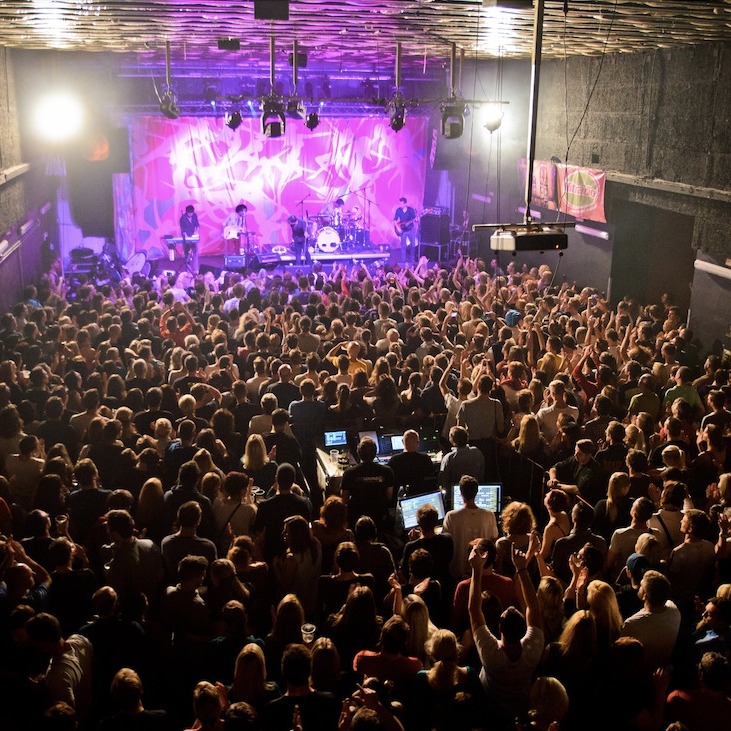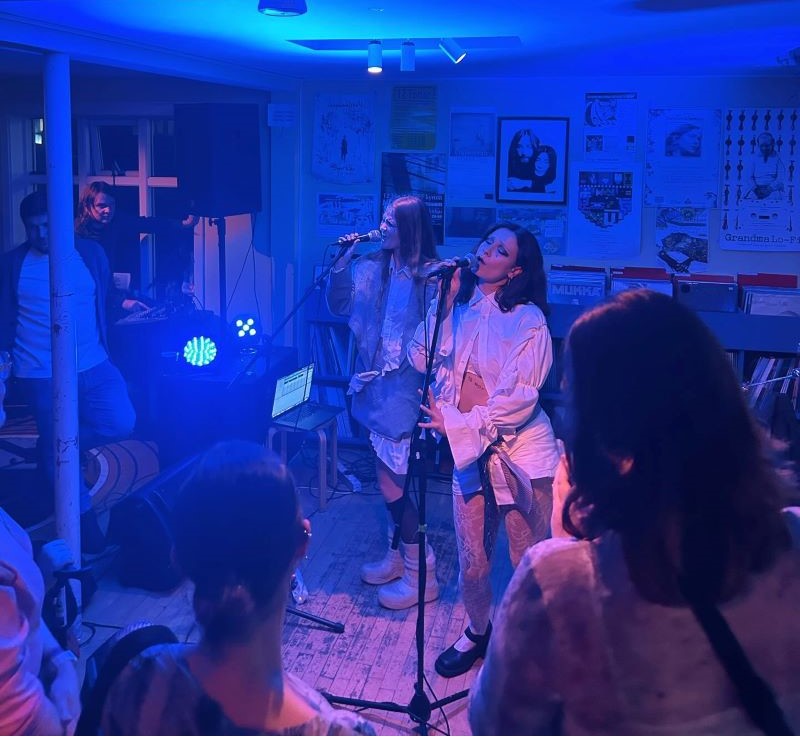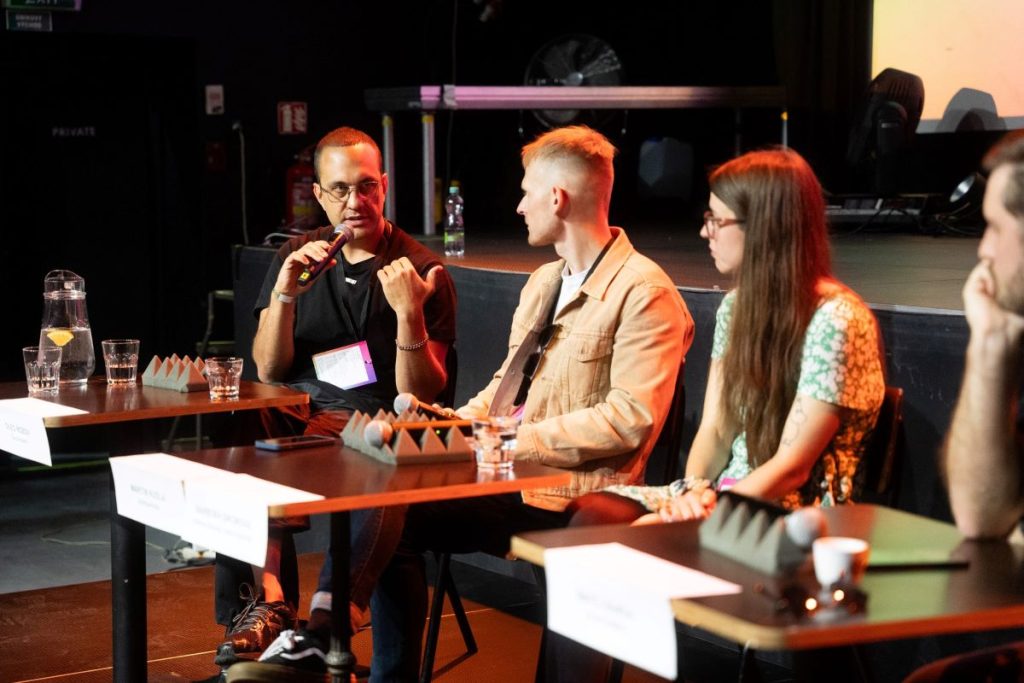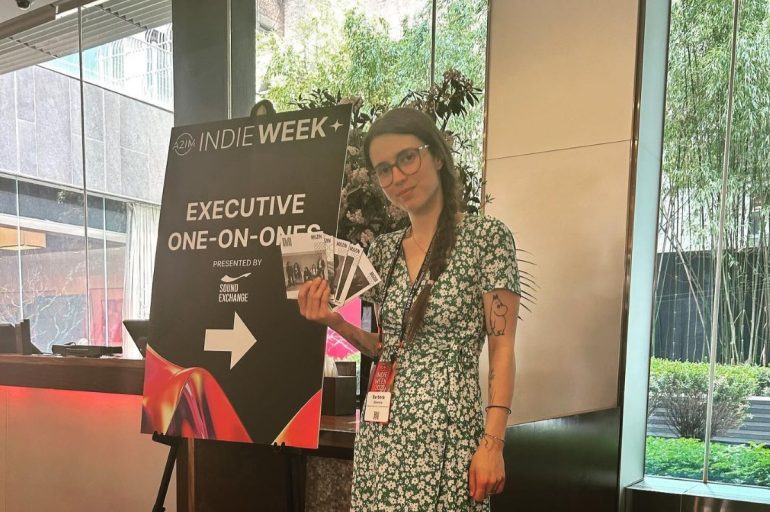Our series, “We are the night” presents artists, promoters, production managers, label owners and others who are bringing the music world of the Czech Republic forward, from the past to the present and the present to the future. This week, we spoke to Barbora Sikorova, a promoter and production manager at Fleda, BATCH Festival, and formerly at Kabinet Muz…
The backstage — the work behind the scenes, the people moving around in the shadows until the lights come on and the music begins. What lies at the core of this role, and what draws people to it?
I spoke to Barbora Sikorova, a key behind-the-scenes figure in Brno’s alternative music scene, reflecting on her work with Fleda, the Batch Festival, and previously with Kabinet Múz.
BD: Where are you from in the Czech Republic, and where did you grow up?
I come from a small town in the south of Moravia, where I grew up. I spent my high school years in Znojmo and have been living in Brno since university.
BD: What is your first memory of music?
That’s a pretty tough question. My whole family and the people around me always loved music, so it was constantly present around me. Moreover, the Znojmo region in general lived and breathed music in every direction. Even when I was small, many of my parents’ friends had bands, and we would go to various city events or wine festivals. My first specific memories, however, are definitely with our old hi-fi stereo, where I would play CDs by Belinda Carlisle or The Corrs.
BD: Do you have any formal musical education?
I’ve been pretty active in this regard since childhood. As a kid, I started with the flute, then I went to a basic art school for guitar, and I’ve been singing since kindergarten. In high school, I went to a pedagogical school, so music education was an integral part. Thanks to that, I also learned to play the piano. In university, I focused only on music theory.

BD: What kind of music do you primarily listen to? What are your preferences?
Before I matured in this regard, I lived under the impression that the only good music was with guitars. Over time, however, I began to appreciate everything, and to this day, I don’t have a favorite genre. I like diversity and the openness to everything. I enjoy discovering new music, but I’m also nostalgic. One shouldn’t be closed off in music. Still, my vinyl shelf says something about me. What is known about me is that I am a fan of the Icelandic music scene, particularly the alternative side. I enjoy everything from dark ambient to rap to classical piano. In the last two years, I’ve been discovering the world of electronic music and ambient. However, I still lean toward Nordic artists who offer something special for my ears.
BD: What was your first approach to working with music venues or entities? How did your journey in music start?
My very first contact with music production as I know it now was probably in my hometown (Hrušovany nad Jevišovkou), where there was a club called Bourák. People would go there for various cover bands, and the first bands of my generation played there. Over time, we moved to the Znojmo-based GoGo Music Club, where a new era began. There, we saw the first “real” bands. That’s also where we organized our first concerts.
My role in the beginning was mainly not to get in the way, carry whatever I could to the van, and cook some great vegan food for the bands. At that time, the Happy Mutant promoter group (later also a record label) started to form. Happy Mutant was primarily managed by the band Rutka Laskier, me, and other friends of ours. We didn’t know much and honestly didn’t know how things worked in bigger clubs, etc., but maybe that’s what made it special. In the early days, we managed to organize a concert for Ravelin 7 in an old, smelly rehearsal space in southern Moravia, and the morning program was a tour of the local wine cellars. It was beautiful.
BD: How did you become involved with Kabinet MÚZ and the Indies Scope label? What was your role, and how would you describe your overall experience?
My first contact with Kabinet was when I organized a concert for the Icelandic artist Sóley in the spring of 2017. Even then, I could imagine it as a place where I would want to work. Then, I went to Reykjavik for four months, and when I returned, I reached out to them to see if they had any positions available. At that time, Tomáš Kelar took me under his wing, and I worked on grants, a little bit of PR, and supplemented it with work in the kitchen (Die Küche).
After Tomáš left, I spent about two months on maternity leave and slowly began returning. It was then that I received a wonderful offer from Martin Kozumplík to take over Kabinet Records. After nearly three years of running Kabinet Records, he also offered me the position of label manager for Indies Records. And such an offer is hard to refuse. The seven years at Kabinet and a year and a half at Indies were an incredible experience for me that pushed me professionally very far. For people in culture, it’s definitely a dream start.

BD: You later moved to Batch Festival, Fléda, and ReConnect. What prompted these changes, and what is your current role?
At that time, a lot was changing around me, and I felt it was time to move forward. In my last year at the label, I really enjoyed working on specific projects and dealing with international contacts, which is within the scope of my work with the Batch music conference and Fléda.
At Fléda, I started with fundraising and back-office work. Given my pedagogical background, I also started working on a project focused on educating children and youth in the field of music industries, which we’re finally realizing this year. On top of that, I began helping with the coordination of the Batch Festival and the ReConnect conference, where my duties are more administrative, but it still brings me into contact with interesting international partners, making it all the more exciting.
BD: What do you see as the main differences between Fléda and Kabinet MÚZ?
They are definitely places that can’t be compared to each other. Kabinet is a community-based venue with a fanbase. Fléda, on the other hand, has a larger reach internationally. Both places have their pros and cons. Both have brought me, and still bring me, completely different experiences that are priceless.
BD: Tell us about Batch Festival. What is the overall idea behind it, and how was the most recent edition? What areas of improvement do you see for future editions?
Batch is magical because of how rich the club scene is in Brno. Eleven clubs work together to create a two-day event that brings the entire city to life. This might be common abroad, but here, it’s something we shouldn’t give up. With one ticket, you can see more than 40 performers over the weekend at the most interesting places in southern Moravia.
In the future, I’d like to see the City of Brno collaborate with the club association. Brno is truly a city of music, and we need to show that to the world. The most recent edition was great. In addition to international and nationally known performers, several local bands also played. I think the Brno music scene really has a lot to offer, it just needs to combine these projects well so that such a festival is beneficial not only for the visitors but also for the performers, helping them reach beyond Brno and ideally even the Czech Republic. This is, of course, an inherent goal of a club night — to connect artists with the audience and with music professionals who can open doors for them.
BD: What is ReConnect?
ReConnect is a fast-growing music conference. It was created in collaboration with the Czech music export office SoundCzech and the Music Managers Forum. Every year, more and more delegates from the music world attend the conference, and I can confirm that over the years, a significant number of great collaborations and, most importantly, new friendships have been formed. I can reveal that this year, you can look forward to some truly interesting names.

BD: How would you compare the music scenes in Brno and Prague?
I’m not a dramaturg, so my view is more amateur. But I’ve always seen it this way — Prague is about business, and Brno is about underground. Of course, I’m not criticizing either place. Quite the opposite. Prague, with its resources and larger audience, has always been able to afford bigger names. In Brno, on the other hand, the DIY scene and “garage” concerts lingered longer. When it comes to the bands that are forming in these cities, Brno will probably always be a bit more authentic.
BD: Would you agree that Brno is slowly gaining recognition on the music map of Central Europe and complementing Prague’s offerings?
Definitely, yes. It will probably take a while before Brno’s clubs and promoters are able to offer artists what Prague (or, for example, Vienna) can, but I think we are slowly getting there. This is also evident in international events comparable to Batch and ReConnect. More and more people from the European scene are aware of Brno, and not just that — they also know the places where music is played. I think it’s particularly noticeable in smaller communities, such as around the electronic scene, hardcore music, and other niche genres. At such events, you can meet global performers. It’s just a shame that, for now, they don’t have as large a fanbase in our area.
BD: What ways can you see for Brno to further improve its range of music events?
For me personally, it has always been and will always be about good education for the audience. Starting from the basics. Good music education for children in schools, good training for educators in the alternative scene, and involving the public. It’s also important to look beyond the city’s borders. Developing international contacts and offering music professionals or artists the kind of conditions that will help us bring as many new and young enthusiasts into the music scene as possible.
BD: Regarding current music trends and bands in the Czech Republic, could you name some bands or labels worth following closely?
I will always be a big fan of the Stoned to Death label, which offers interesting projects across all genres. They also made me very happy this year by releasing a new album from my beloved Never Sol. From the world of classic guitar-based bands, it’s definitely the new album by the Znojmo-based Beach Bum or the new album from MMNK. I admit that I’ve lost track a bit in the Czech scene over the past year, but at least these are worth following.
BD: Can you name three bands or artists to share with our readers?
Recently, I’ve been drawn to a new young artist, Lúpína, and also Sunna Margrét. I’ll stick with my favorite northern artists and definitely recommend Mammút, JFDR, and CYBER.








